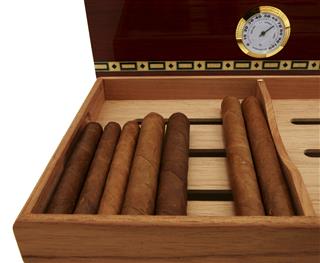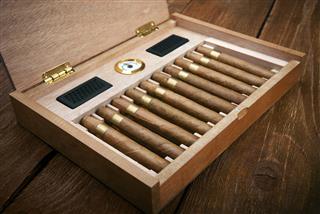
Humidors are boxes with a constant humidity that are used to store cigars. This article lists some tips to keep in mind while buying or making your own humidor to ensure that your cigars are stored correctly.
If cigars are your passion, a humidor isn’t a luxury, it’s a necessity. To make sure your cigars and tobacco are stored properly and safe from the damaging effects of too little or too much moisture, investing in a humidor is the only way to go. But, if you have the time and the inclination, you can make one yourself, customized to suit your needs. These storage cases are easy to make at home. Not only will it be a DIY project that you can take on, but it also has its practical use to keep your cigars in great shape.
Most humidors are made of wood and make use of a hygrometer to ensure that the humidity remains at an optimum level. Some models are made from glass or acrylic as well. Cigars in particular are prone to losing their flavor and the leaves becoming dry and brittle if they aren’t kept in a warm and moist environment, thereby conducive to retaining the texture of the tobacco. Conversely, too much moisture can alter the flavor entirely and could encourage the development of mold. Storage in a humidor ensures that the humidity and temperature are kept as close to optimum as possible.
Plans
When you decide to begin making your own portable storage for your cigars, the first thing to consider is the size you require. Depending on the number of cigars you intend to store, you can scale up or down on the dimensions you select. Once you’ve established the basic design, the rest of the structure will easily fall into place. Wood humidors are generally the most popular not only because of their functionality, but also because of their aesthetic appeal. You can choose from Spanish cedar, rosewood, teak, cherry, birch, walnut, and maple. Spanish cedar is the most popular wood of choice because of its ability to hold more moisture than most woods. Additionally, it imparts its own aroma to the cigar, enhancing the flavor. Another important benefit is its ability to repel insects, particularly tobacco beetles. Spanish cedar is less prone to warping as well.
The main function of a humidor is to maintain humidity and moisture. Ideal storage conditions range around 68-72% relative humidity, and approximately 70º Fahrenheit. Typically, this involves the use of a humidifying element―these are solutions or compounds that release humidity at intervals, popular among which is a solution of propylene glycol and distilled water―the humidity levels are measured using a hygrometer. There are also electronic humidifiers which are battery operated and keep moisture levels in check. Larger humidors may require a hygrometer with rear humidity sensors to be mounted on the front, allowing you to measure humidity without opening the box.
There are a number of online sites that offer free plans for the DIY enthusiast. While it’s easier to buy one, building a humidor from scratch allows you to choose the design and finish to complement your home, while also giving you a chance to showcase your woodworking skills. Take the time to sort through designs until you find one that supports your abilities, and get to work―your cigars will not only last longer, they’ll taste better too.

